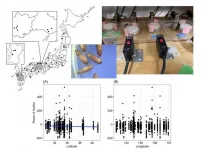INFORMATION:
The study is published in PNAS (Proceedings of the National Academy of Sciences of the United States of America) - https://doi.org/10.1073/pnas.2018936118
This study was funded by the Natural Environment Research Council (NERC), and the Economic and Social Research Council (ESRC) Unconventional Hydrocarbons in the UK Energy System Programme.
It was carried out in partnership with the Universities of Exeter, Bath, Heriot-Watt and Stirling.
For further information, please contact: Joanne Morrison, Press and PR Office, tel +44 131 651 4266, joanne.morrison@ed.ac.uk
Climate change concern unaffected by pandemic, study shows
COVID-19 has not made people any less concerned about climate change -- despite the pandemic disrupting and dominating many aspects of their lives, a study suggests
2021-02-18
(Press-News.org) Covid-19 has not made people any less concerned about climate change - despite the pandemic disrupting and dominating many aspects of their lives, a study suggests.
Over a period of 14 months - including the first three months of the Covid-19 lockdown - neither concern about climate change nor belief in the severity of the problem declined in the UK, the research found.
Researchers compared responses to the pandemic with the financial crisis of 2008 to better understand how worries and priorities can change in a crisis.
In contrast to the economic collapse of 2008, which led to reduced concern with environmental issues, the pandemic has not decreased people's belief in the severity of climate change.
The findings shed light on how a concept called the finite pool of worry applies to climate change. The theory proposes that there are only so many things a person can care about, and when a major crisis happens, some concerns are replaced by others. However, in this case climate change was not replaced by other issues, researchers say
Researchers at the University of Edinburgh surveyed 1,858 people in the UK in April 2019 and asked the same questions again in June 2020.
The survey included five questions to gauge people's beliefs about the reality of climate change, and four about how severe they think it is.
The results showed only small shifts in public opinion. Participants' answers to four of the five questions about the reality of human-caused climate change showed slightly increased concern since the onset of the pandemic.
Only one of the four questions about the seriousness of climate change showed a slight reduction, while the other responses showed no marked change in views.
The results suggest that climate change may now be a permanent part of people's concerns, the researchers say.
Dr Darrick Evensen, of the University of Edinburgh's School of Social and Political Science, said: "Following the financial crisis, it seemed that climate change was one thing that gave, and most people saw it as less of a problem. We are not seeing that same crowding out of climate change as an issue of concern now. This means heightened societal attention to climate change is here to stay."
ELSE PRESS RELEASES FROM THIS DATE:
Smartphone study points to new ways to measure food consumption
2021-02-18
A team of researchers has devised a method using smartphones in order to measure food consumption--an approach that also offers new ways to predict physical well-being.
"We've harnessed the expanding presence of mobile and smartphones around the globe to measure food consumption over time with precision and with the potential to capture seasonal shifts in diet and food consumption patterns," explains Andrew Reid Bell, an assistant professor in New York University's Department of Environmental Studies and an author of the paper, which appears in the journal Environmental Research Letters.
Food consumption ...
Study reveals a new potential mechanism underlying loss of muscle mass during menopause
2021-02-18
Menopause is associated with several physiological changes, including loss of skeletal muscle mass. However, the mechanisms underlying muscle wasting are not clear. A new study conducted in collaboration between the universities of Minnesota (USA) and Jyväskylä (Finland) reveals that estrogen deficiency alters the microRNA signalling in skeletal muscle, which may activate signalling cascades leading to loss of muscle mass.
Menopause leads to an estrogen deficiency that is associated with decreases in skeletal muscle mass and strength. This is likely due to changes in both muscle function and the size of muscle cells commonly referred to as fibers.
"The mechanistic role of estrogen in the loss of muscle mass had not been established. In our study, we focused on signaling cascades ...
Penn-developed CAR T therapy shows long-lasting remissions in non-hodgkin lymphoma
2021-02-18
PHILADELPHIA--A significant number of non-Hodgkin lymphoma (NHL) patients in a Penn Medicine-initiated clinical trial continue to be in remission five years after receiving the chimeric antigen receptor (CAR) T cell therapy Kymriah™, researchers in Penn's Abramson Cancer Center reported today in the END ...
Electrons living on the edge
2021-02-18
Tsukuba, Japan - Scientists at the University of Tsukuba demonstrated the possibility of electrons moving as if they were massless when certain materials called "topological insulators" are irradiated with laser beams. This work may lead to a new class of highly efficient electronic devices and photonic crystals.
Conventional electronic devices rely primarily on silicon crystals. From the point of view of electrons that make up the electrical signals coursing through these materials, the systems are so big as to be practically endless. This causes most of the electronic structures ...
Discovery of biomarker could help predict Alzheimer's years before symptoms emerge
2021-02-18
A unique brain protein measured in the blood could be used to diagnose Alzheimer's disease decades before symptoms develop, according to new Edith Cowan University (ECU) research.
Published in Nature journal Translational Psychiatry, the study is the first to find that people with elevated glial fibrillary acidic protein (GFAP) in the blood also have increased amyloid beta in the brain, a known indicator of Alzheimer's disease.
GFAP is a protein normally found in the brain, but it is released into the blood when the brain is damaged by early Alzheimer's disease.
Alzheimer's disease affects more than 340,000 Australians and more than 35 million people in the world. Current ...
A new piece of the HIV infection puzzle explored
2021-02-18
Scientists at EMBL Heidelberg and at the Zentrum für Infektiologie at Heidelberg University Hospital have succeeded for the first time in imaging HIV during transport into the nucleus of an infected cell. The electron tomographic images show the protein envelope of the virus passing through one of the nuclear pores - the openings in the membrane around the nucleus that allow molecules in and out. The scientists found that the virus passes through the nuclear pore intact, only breaking apart inside the nucleus, where it releases its genetic information. This clarifies an important mechanism by which the virus's genetic material is integrated into the genome of the infected cell.
The human immunodeficiency virus type 1 (HIV-1) - which was ...
Locked MOFs are the key to high porosity
2021-02-18
A highly porous metal organic framework, assembled from molecular building blocks designed to lock together in a specific orientation, has been developed by researchers at KAUST.
Metal organic frameworks (MOFs) are crystalline materials made from metal ions connected by organic linkers. Their internal structure is like a repeating array of tiny identical cages, which are ideal for hosting various molecules. MOFs have found potential uses from gas sensing to molecular separations to storage, depending on the dimensions and structure of their pores.
One family of MOFs has been inspired by inorganic porous materials called zeolites. Zeolites are a special class of porous material with ...
How location dictates biological clocks of species: Study in beetles offers new insights
2021-02-18
One of the most intriguing features in all living beings is the "biological clock", an internal time-keeping mechanism that governs our behavioral pattern (such as the sleep-wake cycle). In fact, the biological clock dictates the developmental timing of various processes, such as when flowers bloom and insects reproduce. Biologists refer to these activities collectively as "circadian rhythms," owing to the rhythmic pattern in which they occur.
Since their discovery, circadian rhythms have been studied extensively, and today we know a great deal about how they work. ...
Perception critical to women's breast reconstruction decision making
2021-02-18
When women undergo surgical treatment for breast cancer, they often also have reconstructive surgery but new QUT research reveals many women feel left out of the decision making.
An interdisciplinary study from researchers in QUT's Centre for Behavioural Economics, Society and Technology (BEST), Engineering Faculty, and School of Nursing, along with Dr Jeremy Hunt a Fellow of the Royal Australasian College of Surgeons and Dr Tim Peltz from the University of New South Wales, on Knowledge, consultation time and choice in breast reconstruction has just been published in the British Journal of Surgery.
"Approximately one in seven Australian women will be diagnosed with breast cancer in their lifetime," ...
Unexpected decrease in ammonia emissions due to COVID-19 lockdowns
2021-02-18
Most Chinese working in the cities return to work today after a 7-day public holiday of Spring Festival. The annual Spring Festival, which also marks the start of Chinese New Year, traditionally begins with the second new moon following the winter solstice, usually in January or February. Like westerners on Thanksgiving and Christmas, people across China return to their hometown to reunite with family and friends. However, the sudden outbreak of COVID-19 last year halted the largest holiday mobilization in the world. In response to the crisis, in late 2019, local governments launched ...
LAST 30 PRESS RELEASES:
Scientists show how to predict world’s deadly scorpion hotspots
ASU researchers to lead AAAS panel on water insecurity in the United States
ASU professor Anne Stone to present at AAAS Conference in Phoenix on ancient origins of modern disease
Proposals for exploring viruses and skin as the next experimental quantum frontiers share US$30,000 science award
ASU researchers showcase scalable tech solutions for older adults living alone with cognitive decline at AAAS 2026
Scientists identify smooth regional trends in fruit fly survival strategies
Antipathy toward snakes? Your parents likely talked you into that at an early age
Sylvester Cancer Tip Sheet for Feb. 2026
Online exposure to medical misinformation concentrated among older adults
Telehealth improves access to genetic services for adult survivors of childhood cancers
Outdated mortality benchmarks risk missing early signs of famine and delay recognizing mass starvation
Newly discovered bacterium converts carbon dioxide into chemicals using electricity
Flipping and reversing mini-proteins could improve disease treatment
Scientists reveal major hidden source of atmospheric nitrogen pollution in fragile lake basin
Biochar emerges as a powerful tool for soil carbon neutrality and climate mitigation
Tiny cell messengers show big promise for safer protein and gene delivery
AMS releases statement regarding the decision to rescind EPA’s 2009 Endangerment Finding
Parents’ alcohol and drug use influences their children’s consumption, research shows
Modular assembly of chiral nitrogen-bridged rings achieved by palladium-catalyzed diastereoselective and enantioselective cascade cyclization reactions
Promoting civic engagement
AMS Science Preview: Hurricane slowdown, school snow days
Deforestation in the Amazon raises the surface temperature by 3 °C during the dry season
Model more accurately maps the impact of frost on corn crops
How did humans develop sharp vision? Lab-grown retinas show likely answer
Sour grapes? Taste, experience of sour foods depends on individual consumer
At AAAS, professor Krystal Tsosie argues the future of science must be Indigenous-led
From the lab to the living room: Decoding Parkinson’s patients movements in the real world
Research advances in porous materials, as highlighted in the 2025 Nobel Prize in Chemistry
Sally C. Morton, executive vice president of ASU Knowledge Enterprise, presents a bold and practical framework for moving research from discovery to real-world impact
Biochemical parameters in patients with diabetic nephropathy versus individuals with diabetes alone, non-diabetic nephropathy, and healthy controls
[Press-News.org] Climate change concern unaffected by pandemic, study showsCOVID-19 has not made people any less concerned about climate change -- despite the pandemic disrupting and dominating many aspects of their lives, a study suggests


